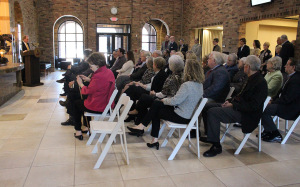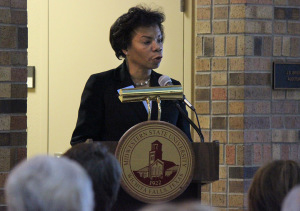
At a reception in front of a crowd made up of donors, administrators, board members, faculty and even ex-Regents, University President Jesse Rogers introduced the formation of the Robert L. Bolin Graduate School of Petroleum Geology.
“Students may complete this program in a five-year format, receiving both their Bachelor of Science and Master of Science degrees simultaneously. I think that’s very innovative,” Rogers said in a short speech. “Of course, they also may take the traditional route and finish their bachelor’s degree before moving on to a two-year program.”
Rebecca Dodge, associate geology professor and graduate coordinator for the geoscience program, said demand for a graduate petroleum geology program already existed within the college and the community.
“There are students here in our program already who want to go on to graduate school here,” Dodge said. “We have also in the community many students who have graduated from MSU with a bachelor’s degree in geosciences who now are already asking how they can come back and get their master’s degree.”
Dodge said the program will attract new students, and will even help the faculty complete more research.
“We’ve got a good, strong enrollment, but this will help improve that, and it will draw more students to university, and it will just be great to have more graduate students to work with. It will expand the faculty’s ability to get involved with research because we’ll be working directly with the graduate students,” Dodge said.

Dodge said the new courses for the program have already been prepared, but Provost Betty Stewart said a new faculty member will need to be hired using funds from the gift provided by the Bolin family. Stewart also said the program will begin fall 2015 pending final accreditation.
“Now we just have to send it to our regional accrediting body, and then they will review it and let us know,” Stewart said. “Usually it’s three to six months, and we submitted in January, so we should be hearing back pretty soon.”
The Bolin Graduate School marks the third petroleum-centric program to be introduced in recent years with the creation of petroleum engineering program and the Dillard Center for Energy Management set to open this August.
“We hope that this will be a synergistic relationship that will cross students from all the areas, so if our students don’t want to get a master’s in petroleum geology, maybe they want to get an MBA,” Stewart said.
Stewart said the five-year program in which students would essentially earn their bachelor’s and master’s degrees simultaneously would be rigorous, but it would put graduates of the program ahead of their peers.
“If a student comes to the university and knows what they want to do when they get here, it’s easy to work through the program. They’re going to have to work hard, they’re going to have to take a full class load every semester, but they’ll have a master’s degree in five years and they’re ready to go to work,” Stewart said. “But you’re going to have to be really focused when you come in the door. There will be a very prescribed curriculum that they will have to follow, but they’ll have to know when they come in the door that that’s what they want to do. If they want to explore, they’re not going to finish in five [years].”
Related: Geoscience students support petroleum graduate school














